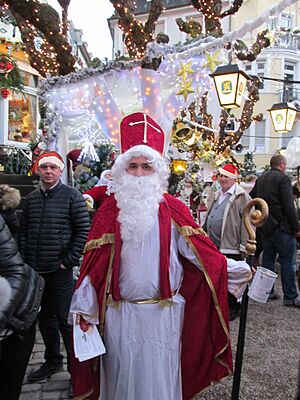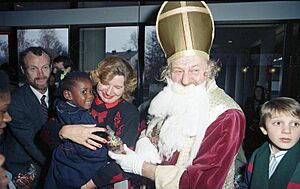Weihnachten facts for kids
Weihnachten is the German word for Christmas. It's a special holiday celebrated in German-speaking countries like Germany, Austria, and Switzerland. People also celebrate Weihnachten in places with German-speaking communities. This includes areas like Transylvania in Romania, South Tyrol in Italy, and Eupen in Belgium. German families living in other countries, like German Brazilians and German Americans, also keep these traditions alive. Many Christmas customs around the world have been influenced by Weihnachten.
Contents
Preparing for Weihnachten
Before Weihnachten arrives, many families celebrate a special time called Advent. This is a period of getting ready for the arrival of Christkind (the Christ Child).
Advent Wreaths and Calendars
A common Advent tradition is the Adventskranz (Advent wreath). This wreath is set up on the fourth Sunday before Christmas Day. It has four candles, and one new candle is lit each Sunday. Families often sing Christmas carols together around the wreath.
Children especially love the advent calendar. This calendar has 24 small doors, one for each day in December leading up to Christmas. Kids open one door each day to find a chocolate treat. Many calendars also have fun Christmas pictures behind the doors.
Nikolaustag: Saint Nicholas Day
A very important part of the Christmas build-up happens on December 6th. This day is called Nikolaustag, which celebrates Saint Nicholas. On the evening of December 5th, children in Germany place a Nikolausstiefel (a boot or shoe) outside their front door.
Overnight, the Nikolaus visits. He looks a lot like Santa Claus. If children were good, he fills their boots with sweets and small presents. If they were naughty, they might find only a rute (a birch twig cane). In Switzerland, on the evening of December 6th, an empty small bag is placed outside. A few minutes later, the Samichlaus (the Swiss German name for Nikolaus) and his helper Schmutzli fill the bag and come into the house.
Christmas Markets and Treats
During the Christmas season, almost every city, town, or village in German-speaking countries has a Weihnachtsmarkt (Christmas market). Visitors can enjoy many stalls, entertainment, and delicious food. A popular drink is Glühwein (mulled wine).
Traditional Christmas treats include Lebkuchen (gingerbread), Stollen (fruit cake), Speculaas, and marzipan (a sweet almond treat). The most famous market is the Christkindlesmarkt in Nuremberg, which attracts millions of people every year.
The Christmas Tree and Christmas Eve Meal
The Weihnachtsbaum (Christmas tree) is usually put up on the afternoon of December 24th. Families can buy trees from special sellers. Some families still go into the forest to cut their own tree.
On Heiligabend (Christmas Eve) in Germany, families often have a simple meal. This meal is served before or after the Bescherung (the gift-giving time). Unlike Christmas Day, Christmas Eve usually doesn't have a big feast. Many Germans enjoy Eintopf (a stew) or Würstchen (sausages) with potato salad on Heiligabend. Other common meals include carp, fondue, or raclette. On Christmas Day, the most popular dishes are roast goose or duck.
Christmas Eve Celebrations
Many families start their Heiligabend (Holy Evening or Christmas Eve) celebrations in the afternoon or evening. Even though Christmas Day and the day after are holidays in Germany and Austria, Christmas Eve is not. In Switzerland, many shops are open for half the day until 4 p.m. before celebrations begin.
Church Services
Many people go to church before the celebrations start. Christmas services usually last about an hour. Families with children often go to a special children's mass. These services are usually shorter and include a Krippenspiel (nativity play).
Gift-Giving Traditions
After returning from church, the gift-giving customs can be different across German-speaking countries. Often, children wait outside a locked living room. A small bell rings, which means the gift-giver has left. In more Catholic areas, mainly South Germany and Switzerland, the Christkind brings the gifts. In North Germany, people usually believe the Weihnachtsmann (Saint Nicholas or Santa Claus) has just left.
The children then enter the room to see the decorated Weihnachtsbaum (Christmas tree). All the presents are wrapped in colorful paper and placed under the tree. Adults usually prepare these gifts while the children are at church. Adults might also exchange gifts while the children open theirs. In Germany, during the Bescherung, the only light often comes from the Christmas tree lights. Traditionally, these were real candles, but now electric lights are more common. In Switzerland, gift-giving happens after the big evening meal.
Weihnachtsmann's Visit
Another tradition in many homes does not involve a ringing bell or presents already under the tree. Instead, the Weihnachtsmann (often a relative in costume) knocks on the door. Once he is let in, he puts down his sack and rute (shepherd's crook). He then greets the family.
He might ask the children to sing a Christmas song or recite a poem. Then he asks if they have been naughty or nice. Most children admit they haven't always been nice. The Weihnachtsmann asks them to promise to do better next year before giving them their presents. After that, he leaves, and the family enjoys their gifts and time together.
After Christmas Eve
On the first or second Day of Christmas (December 25th and 26th), many typical Christmas meals are served. Popular dishes include goose, duck, fondue (with different kinds of meat), raclette, and game dishes. In Switzerland, smaller meals are often served.
The Christmas tree is usually taken down after the second week of January. Real trees are left outside for trash collectors. Some families use artificial trees, which they simply pack away until the next Weihnachten.
See also
 | Georgia Louise Harris Brown |
 | Julian Abele |
 | Norma Merrick Sklarek |
 | William Sidney Pittman |



